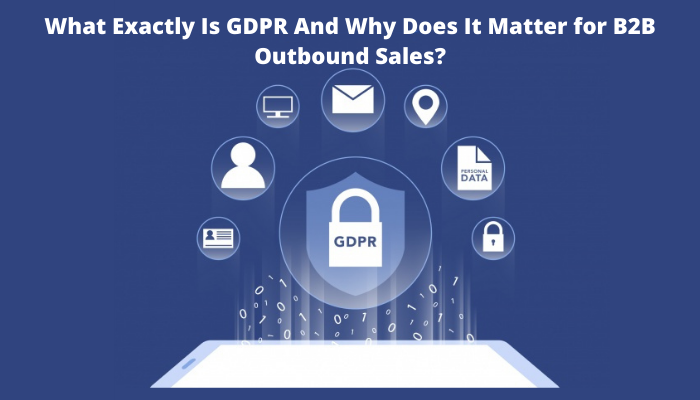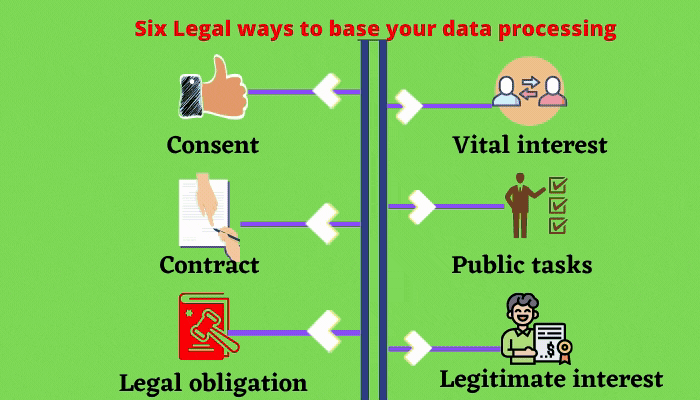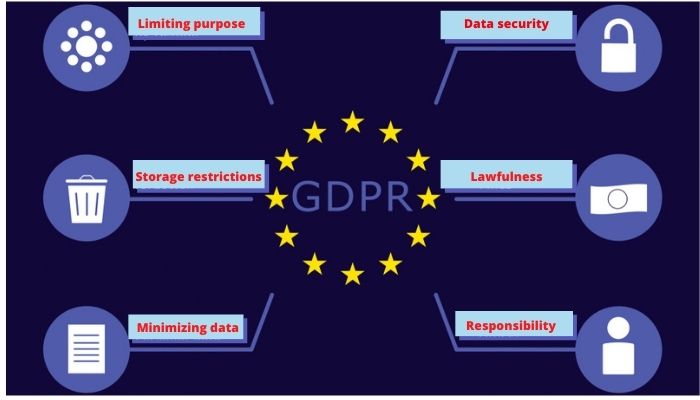Businesses today are data-driven. Most of the data generated and consumed by businesses pertain to the clients that are reached out. In such circumstances, data compromise is an obvious concern at large. This necessitates the manifestation of regulations that protects the integrity and confidentiality of data and governs the way it is used. When you are acquiring data to expand your customers’ install base, it is imperative to ensure that their data is not exploited in the wrong way.
The GDPR or General Data Protection Regulation is an evolution of regulations that enforce data protection. These rules are already in place and businesses and data mining services must comply with them. These rules are not fully enforced though, giving you a grace period to ensure compliance. Here, we intend to deliver a comprehensive description of GDPR, its importance for B2B businesses, and its impact on their sales and marketing.
Understanding GDPR and its importance
GDPR is a legislation that provides more control to the individual on their data. According to this statute, a person gets complete disclosure visibility, traceability, and disclosure of purpose his/her data is used for. The primary objective of this regulation is to prevent the fundamental right of privacy to the individual and provide them more freedom. It has great implications in the business settings where data theft and security breaches have cost heavily to the organization and individuals.
The law empowers a person to impede random solicitation of their data and orders acquisition of explicit consent for using such data. It defines personal data as any piece of information related to an identifiable or identified person. It encapsulates your name, email, phone number, IP address, and even your employer’s/company’s name.
GDPR is important for B2B businesses as its non-compliance can result in heavy penalties. It can even make some organizations go out of business. It gives the right to the individual to claim compensation for the misuse of their data. As the law requires businesses to report a breach in not more than 72 hours, they have to reform their internal reporting processes.
Impact of GDPR on B2B Outbound sales and marketing
Outbound sales bring in major businesses and revenue generation for B2B organizations. It also extensively uses a pre scraped data solution or collection data of the prospects to reach out to them with the most effective strategy. However, with GDPR, businesses have to rethink the way they use this data.
The law defines 6 legal bases for data processing. Your personal data processing must comply with at least one of them. However, there is a liberty to choose the method based on the type of data. For instance, data pertaining to prospects or clients are treated differently from the employee’s data.
Six Legal ways to base your data processing
-
-
Consent
-
You have acquired explicit and clear consent from the individual to use his/her personal data for the given purpose
-
-
Contract
-
You need to have a formal contract with the individual clearly defining what data you use, how, and for what purpose. Your processing must comply with the contract. This is necessary when the individual asks for specific legal steps before granting data usage permission.
-
-
Legal obligation
-
Legal obligation processing is required to comply with the law in cases that do not include obligations through contract.
-
-
Vital interest
-
The processing for vital interest is important to protect the life of the individual.
-
-
Public tasks
-
When your purpose includes a task in the public interest, your official task, or a task that has an apparent basis in the law, you would need this processing.
-
-
Legitimate interest
-
This processing is necessary for your or third party’s legitimate interest unless the protection of individual interest overrides the legitimate interest.
Many organizations exploit the ‘legitimate interest’ to continue with their policies for data usage. However, experts suggest against the practice as the repercussions are not clearly known at present and can be massive.
Companies need to redefine their opt-in policies, as clear consent is needed from the subject for using their data. Companies have to find ways to obtain consent from the subjects already on their list. A pre scraped data solution can help companies by providing the list of subjects that are already verified and permitted the data use.
-
Online data collection
GDPR allows the use of data that is publicly available online such as a company’s contact number. However, it mandates keeping a detailed record of who, what, where, how, why, and when of the data usage. They must provide this information to the authorities when asked for.
Small organizations functioning with less than 250 employees are not required to maintain such hefty records. If data usage of small companies includes frequent risks to the rights and freedom of the subject, the exemption is overruled.
-
Data purchase from the third party
B2B marketers must be extremely careful while purchasing data from third-party providers or skip tracing services. Although the purchase is an easy way of data appending, it can put you at great risk. Most brokers claim to have clear consent from every subject. However, it can cost you a fortune if their claims do not specifically apply to your purchase.
-
Revival of telemarketing
How companies can obtain consent and utilize the CRM / ERP data of prospects they already have is a big question. In answer to this, the GDPR allows telemarketing in B2B space. You can use outbound Phoning to reach out to prospects and current clients to establish the ground for consent. You can also get oral consent and keep the record of calls and CRM timestamp to prove the consent. The same can also be used to contact new prospects for email appending for marketing purposes.
Also Read: Ask Me Anything: 10 Answers to Your Questions about Telesales and Telemarketing
Best practices for B2B outbound sales teams
GDPR imposes several restrictions on data usage and you will need to make additional efforts to adhere to the best practices.
-
Documentation and accountability
GDPR mandates you to hold accountability for your B2B data usage. You must maintain a transparent record of what data you are using and how and who controls the data and its deletion. It must also include details of the third party is involved. This practice is not compulsory if you function with less than 250 employees and your data processing is occasional.
-
Data scrubbing
This aspect is greatly beneficial for B2B organizations. Data scrubbing ensures that you are connecting the right prospects and your efforts are not wasted. According to the legislation, you need to take prior permission before sending emails in large volumes. This is not a big concern for businesses as data verification and market research have always been a part of their process.
-
Gaining consent
Despite being popular this basis is also very intriguing and complex. The GDPR laws defining consent and consent acquisition are rigid and need B2B markets to do additional work to ensure compliance. You need to check your process on an on-going basis and refresh them as and when required. You also have to empower the data subject to withdraw consent at any time.
-
Establishing legitimate interest
Legitimate interest allows you to process individuals’ data with an assumption that you contacting them would be useful for them. Many B2B markets use this basis for data collection, phone appending, and finally contacting the prospects. However, such businesses must clearly define their legitimate interest as B2B marketers have a better knowledge of the customers who buy their products or services.
The fundamental principle behind GDPR in a nutshell
Knowing primary objectives and the principles the GDPR works on can make the task a bit easier. This can also serve as a thought leader for your outbound sales team to ensure compliance and still achieve their targets.
-
Lawfulness
The law aims at ensuring that every action that involves the use of data must be fair and legal. You must maintain transparency in the entire data appending process and usage.
-
Limiting purpose
GDPR intends to limit the purpose for which the data is being used. It mandates companies to clearly mention the purpose of the subject. You can use the data only for the objective you have taken consent for.
-
Minimizing data
As compliance to the GDPR laws and legal basis needs a lot of additional work from the B2B outbound sales team, it will limit the data being used. Companies will not collect data that is not currently needed.
-
Precision
Such confining and exclusive use of data also encourage the resolution of inaccuracy as soon as possible. It ensures that the data is kept up to date with frequent data scrubbing.
-
Storage restrictions
The consent for data usage also includes the duration for which it will be stored by the companies. B2B marketers can store the data only for the period that is needed to achieve their objectives.
-
Data security
The law also protects unauthorized access to data. It forces the companies to keep the data at a secured location and environment to prevent theft and malicious use.
-
Responsibility
GDPR also holds the organization using personal data accountable. They are bound to show that they comply with the regulations at any given point in time.


